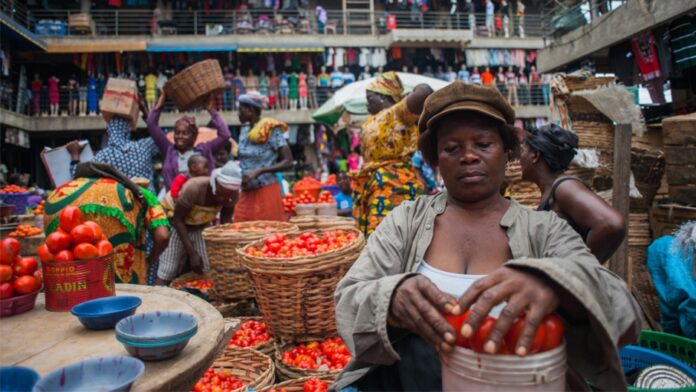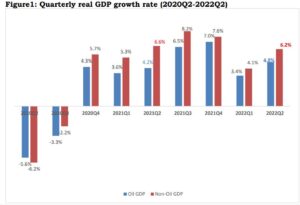
Provisional figures released by the Ghana Statistical Service show that Ghana’s economy grew by 4.8% in the second quarter (April to June) of 2022 compared to the same period in 2021.
Ghana’s real GDP increased by 1.1% in the second quarter (April to June) of 2022; representing 0.2 percentage points higher than what was recorded in the first quarter (January to March) of 2022.
The Manufacturing, Crops, Mining & Quarrying, Information & Communication,
and Education sub-sectors were the main drivers of GDP growth for the second quarter of 2022, Government Statistician Samuel Kobina Annim told reporters, on Tuesday.
Quarterly real GDP growth
Provisional real quarterly gross domestic product (QGDP) growth rate including Oil and Gas, is 4.8% (year on year) in the second quarter of 2022. In the same period of 2021, the growth was 4.2%.
GDP growth rate without oil and gas (Non-Oil GDP) for second quarter of 2022 is 6.2 % which compares to the same period in 2021 with a growth rate of 6.6%.
The Services sector recorded the highest growth of 5.2%, followed by the Agriculture sector with a growth of 4.6% and the Industry sector with a 4.4 percent growth rate.

Real quarterly gross domestic product
The GDP (Including Oil & Gas) estimate at constant 2013 prices for the 2nd quarter of 2022 was GH¢41,205.5 million compared to GH¢39,304.6 million in the 2nd quarter of 2021.
The Non-oil GDP at constant 2013 prices for the 2nd quarter of 2022 was
GH¢38,976.1 million compared to GH¢36,690.0 million in the 2nd quarter of
2021.
Nominal quarterly gross domestic product
The GDP estimate at current prices in purchaser’s value1 for the 2nd quarter of 2022 was GH¢132,263.5 million compared to GH¢102,326.5 million in the 2nd quarter of 2021.
The Non-oil GDP (GDP without Oil and Gas) estimate at current prices for the 2nd quarter of 2022 was GH¢123,080.4 million compared to GH¢97,227.9 million in the 2nd quarter of 2021.
The finance ministry in July cut its growth forecast for 2022 to 3.7% from 5.8%.
Meanwhile, Ghana races against time to tie down a bailout programme as the economy struggles against the backdrop of higher inflation, tighter financial conditions, and weaker growth.
The country’s inflation rate climbed to the highest level in 21 years in August fueled by a slide in the cedi. Consumer prices surged 33.9% in August from 31.7% in July.
Ghana is in dire need of a $3 billion package from the IMF to shore up its economy.

